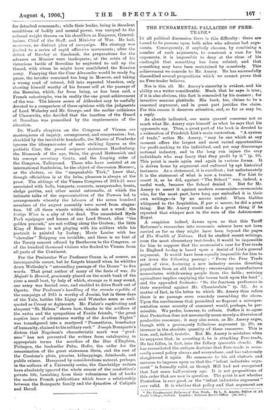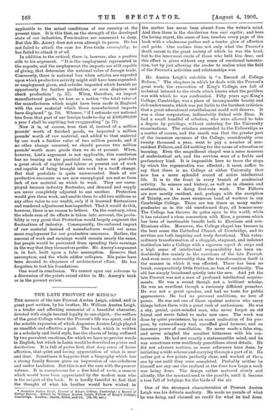THE FUNDAMENTAL FALLACIES OF FREE-
In all political discussion there is this difficulty : there are bound to be persons upon both sides who advance bad argu- ments. Consequently, if anybody chooses, by combining a number of such arguments, to construct a case for hie opponents, it is impossible to deny at the close of his onslaught that something has been refuted, and that something may have been maintained by somebody. This achievement we concede to Mr. Amery. He has successfully discredited several propositions which we cannot prove that no Free-trader believes.
Nor is this all. Mr. Amery's sincerity is evident, and his ability as a writer considerable. Much that he says is true; if it is also obvious, this fact is concealed by his manner ; for invective seasons platitude. His book, too, claims to be a reasoned argument, and in great part justifies the claim. For this reason it deserves attention, and, so far as may be, a reply.
As already indicated, our • main quarrel concerns not so much what Mr. Amery says himself as what be says that his opponents say. Thus, a great part of the book is devoted to a reiteration of Friedrich List's main contention. "A system of trade," writes Mr. Amery, "may be one which at any moment offers the largest and most varied opportunities for profit-making to the individual, and yet may discourage national industry, and in the long run injure the very individuals who may fancy that they profit by it" (p. 10). This point is made again and again in various forms. It is driven home by argument and enforced by apt historical instances. As a statement, it is excellent ; but unfortunately it is the statement of what is now a truism. For List to assert it, as he did, against "The School" was, indeed, a useful work, because the School denied it. But for Mr. Amery to assert it against modern economists—economists who, for the most part, have long ago embodied it in their own writings—is by no means useful. When Galileo whispered to the Inquisition, B pur si muove, he did a great thing. But Mr. Amery would not do a great thing if he repeated that whisper now in the ears of the Astronomer- Royal.
A suspicion indeed, dawns upon us that this Tariff Reformer's researches into economic science have not been carried as far as they might have been beyond the pages of The Wealth of Nations. Had he studied recent writings, even the most elementary text-books, it would be impossible for him to suppose that the economist's case for Free-trade in England to-day is based upon a denial of List's general argument. It would have been equally impossible for him to set down the following passage : "From the Free Trade point of view, fostering a new industry means diverting population from an old industry ; encouraging manufactures necessitates withdrawing people from the fields ; reviving agriculture implies emptying the towns back upon the land" ; and the appended footnote : "So the fourteen professors in their encyclical against Mr. Chamberlain" (p. 32). As a matter of fact, in the letter to which Mr. Amery thus refers there is no passage even remotely resembling the above. Upon the carelessness that permitted so flagrant a misrepre- sentation some severity of comment would, perhaps, be per- missible. We prefer, however, to refrain. Suffice it to agree that Protection does not necessarily mean merely a diversion of productive resources; it may also mean, as Mr. Amery urges, though with a grotesquely fallacious argument (p. 29), an increase in the absolute quantity of these resources. This is true, and, indeed, truistic. But Mr. Amery is mistaken when be supposes that, in asserting it, be is attacking Free-trade. He has fallen, in fact, into the fallacy ignoratio elenchi. He has resuscitated the antique doctrine that Free-trade is neces- sarily sound policy always and everywhere, and has valorously slaughtered it again. He summons to his aid rhetoric and sarcasm to impress upon us that the "infant industries argu- ment" is formally valid, as though Mill had not recognised that fact some half-century ago. It is not propositions of this order that are now in question. The point is not whether Protection is ever good, or the "infant industries argument" ever valid. It is whether that policy and that argument are • The Fundamental Fallacies of Fres Trade. By L. S. Amery, Fellow of AU Souls' College, Oxford. London : national Review Office. [22. net.] applicable to the actual conditions of our country at. the present time. It is this that, on the strength of the developed state of our industries, Free-traders are concerned to deny. But this Mr. Amery does not even attempt to prove. He has not failed to attack the case for Free-trade sztccessfally; be has failed to attack it at all.
In addition to the critical, there is, however, also a positive side to his argument. "It is the employment represented in the exports, and the employment the imports are still capable of giving, that determine the national value of foreign trade. Conversely, there is national loss when articles are exported upon which productive activity might still have been expended. or employment given, and articles imported which furnish no opportunity for further production, or even displace and check production" (p. 57). When, therefore, we import manufactured goods, we lose as a nation "the total value of the manufactures which might have been made in England with the raw material which those manufactured imports have displaced" (p. 70). Whence, "if I estimate our national loss from that part of our foreign trade to-day at £300,000,000 a year I shall be anything but exaggerating" (p. 71).
Now it is, of course, true that if, instead of a million pounds' worth of finished goods, we imported a million pounds' worth of raw material, and added to that material by our work a further value of two million pounds, and if no other change occurred, we should possess two million pounds' worth more goods than we do at present. When, however, List's argument is not applicable, this conclusion has no bearing on the practical issue, unless we postulate a great stock of capital and labour at present out of work and capable of being brought into work by a tariff change. But that postulate is quite unwarranted. Such of our productive resources as are now unemployed are not so from lack of raw material on which to work. They are unem- ployed because industry fluctuates, and demand and supply are never completely adjusted to one another. Protection would give them work, and enable them to add two millions or any other value to our wealth, only if it lessened fluctuations and rendered adjustment less imperfect. That it would do this, however, there is no reason to believe. On the contrary, when the whole sum of its effects is taken into account, the proba- bility is very great that Protection would largely augment the fluctuations of industry. Consequently, the enforced import of raw material instead of manufactures would not mean more employment for our productive resources. Rather, the amount of work and earnings would remain nearly the same, but people would be prevented from spending their earnings in the way that they themselves prefer. Mr. Amery's argument is, in fact, built upon a false assumption. Remove that assumption, and the whole edifice collapses. His pains have been devoted to elegances of architectural effect. He has forgotten to test his foundations.
One word in conclusion. We cannot open our columns to a discussion of the points raised either in Mr. Amery's book or in the present review.







































 Previous page
Previous page